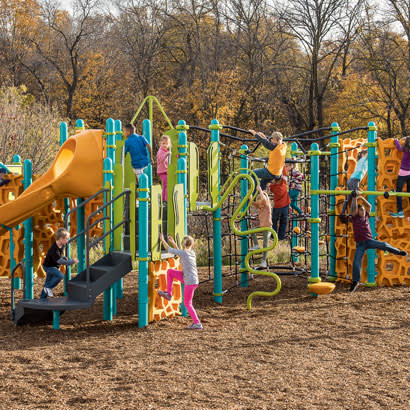
In a poll conducted by Landscape Structures Inc., a Delano, Minnesota-based commercial playground equipment manufacturer, more than half of parents responded that they think children today have fewer opportunities for play than children 20 years ago. Parents reported that their children get one hour or less of unstructured playtime each day: 55 percent of parents with children ages 10 to 12, 42 percent of parents with children ages 3 to 9 and 34 percent of parents with children up to age 3. Almost two-thirds of those polled think the ideal amount of daily playtime is between one and two hours.
Parents advocate for playtime, too. Even in today’s 24/7 world, more than three-quarters of parents polled agreed that children with adequate free playtime grow up to be better contributors to society. Educators and child development experts agree that play is vital to children’s cognitive, social/emotional and physical development and growth.
While they may be stressed and over-scheduled themselves, today’s parents recognize the value of free, unstructured time for their children’s overall health and well-being. “Modern life takes a toll on children too,” says Lynn Pinoniemi, director of marketing at Landscape Structures.
“More kids are being diagnosed with anxiety, depression and obesity — and many live with disabilities,” she says. “But giving kids the freedom to play — to gain confidence through mastery and self-discovery — can really nurture small psyches and instill lifelong skills.”
Landscape Structures surveyed parents of children 12 years and younger to understand their attitudes on the value of unstructured play. Topics ranged from opportunities for free play to important life skills gained on the playground.
When asked about important life skills, the parents surveyed considered play and creativity of similar importance as academics and critical thinking. Most mothers (92 percent) rated play and creativity as moderately or very important, compared to 84 percent of fathers.
Persistence was considered a top skill for children of all ages to learn. Creativity was more likely to be chosen for younger children, while leadership was likeliest for older children. Parents reported that sharing, imagination and creativity were the skills most often exhibited by their own children on the playground.
A recent meta-study conducted by the University of Minnesota Institute of Child Development and commissioned by Landscape Structures, titled “Shaped by Play: The Formative Role of Play and Playgrounds,” confirms our culture’s growing infringement on children’s play opportunities.
According to the study, a long list of daily distractions competes for children’s free time: hectic family lifestyles, organized activities, TV and electronic devices, and academically packed school schedules that cut into recess. Request a copy of the full research whitepaper at shapedbyplay.com.
The survey and meta-study are part of Landscape Structures’ Shaped by Play campaign. Learn more about the campaign, and watch the company’s inspirational video, For a Better Tomorrow, We Play Today.

